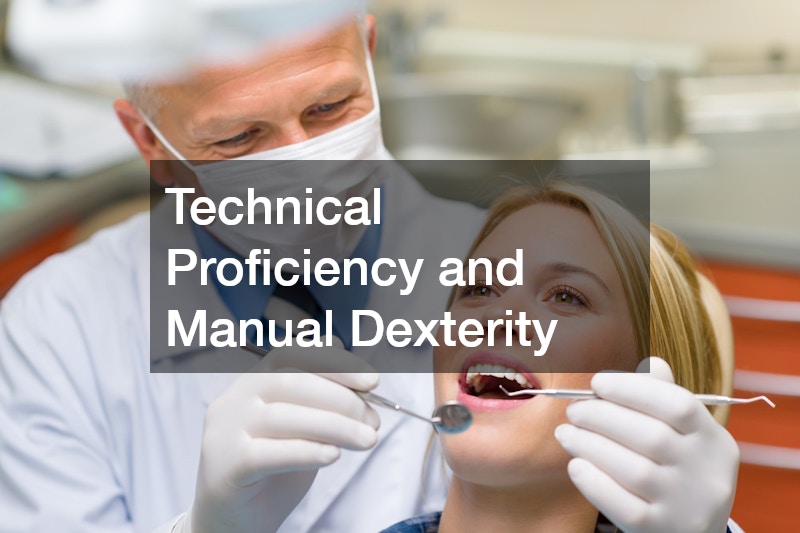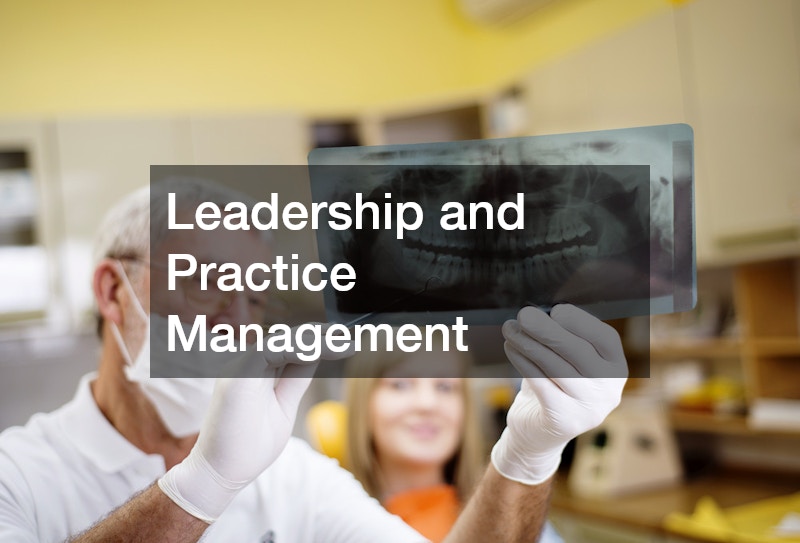
The path to becoming a dentist requires much more than academic excellence or a passion for oral health. It’s a profession that calls for a wide array of technical abilities, interpersonal strengths, and business acumen. Whether you’re preparing to apply to dental school or are simply curious about what it takes to succeed in this career, understanding the key traits and capabilities that define great dentists is essential.
Dentistry is both an art and a science. You’re expected to understand anatomy, pathology, and pharmacology—yet you must also be highly dexterous, perceptive, and empathetic. You’ll deal with people of all ages, personalities, and levels of dental fear or discomfort. The pressure to get procedures right the first time is intense, especially in high-stakes situations, such as working as an emergency cosmetic dentist or managing pediatric patients who struggle with anxiety.
Whether someone is seeking basic cleanings, dental veneers, or full-mouth restorations, they’re trusting you with their health and appearance. That trust carries responsibility, and your ability to meet it depends on more than just your degree. In this article, we’ll explore the skills you need to be a dentist—diving deep into the knowledge, soft skills, and behind-the-scenes strengths that separate good dentists from great ones.
Technical Proficiency and Manual Dexterity
One of the most fundamental skills you need to be a dentist is manual dexterity. Every dental procedure, from a simple filling to the application of dental veneers, requires precise control over instruments in a small, often hard-to-reach space. Even the slightest slip of the hand can lead to discomfort, damage, or unsatisfactory results.
Developing fine motor skills is essential from the start of your dental education. Students spend countless hours practicing on models and simulators to refine their ability to work with minute detail. This coordination becomes second nature over time but must be nurtured and maintained with continued practice.
Beyond dexterity, dentists must have a strong understanding of dental anatomy, oral pathology, and pharmacology. This scientific knowledge allows them to make accurate diagnoses and determine the best treatment options for each patient. These aren’t optional traits—they’re the bedrock of your credibility as a healthcare provider. A dentist lacking technical skill will struggle to build a positive reputation or attract loyal patients, even if they’re excellent in other areas.
Communication and Interpersonal Skills
No matter how skilled a dentist is clinically, they will never succeed if they lack strong communication skills. Every appointment is a conversation—an opportunity to educate, calm, and collaborate with the patient. You must explain complex procedures in layman’s terms, understand patient concerns, and respond with empathy.
Good communication also improves outcomes. Patients who understand their treatment plans are more likely to comply with them. Whether you’re advising a nervous parent at your pediatric dentist office or helping a senior understand the steps involved in denture services, your ability to speak clearly and compassionately is crucial.
Listening is just as important. A patient may describe symptoms that aren’t visible upon inspection, or they may express concerns that help you tailor their care. For instance, a patient seeking cosmetic dentists may be most worried about subtle aesthetic details, like tooth symmetry or shading. Your job is to hear what’s said—and what isn’t—so you can meet expectations accurately and thoroughly.
Emotional Intelligence and Empathy
Empathy isn’t just a feel-good trait—it’s a vital part of the dental profession. Understanding what your patients are experiencing, and responding with care and consideration, helps build trust and reduces anxiety. This is especially important in situations where patients feel vulnerable, such as when they’re experiencing pain or embarrassment about the condition of their teeth.
Children and patients with dental phobias often need extra reassurance. If you work as a pediatric dentist, your ability to remain calm, playful, and patient can make a dramatic difference in how a child views dental care for the rest of their life. Similarly, patients in pain who seek out an emergency cosmetic dentist are likely stressed and afraid. Your reaction in these moments defines their experience.
Empathy also improves teamwork. Dentists often work closely with hygienists, assistants, and office staff. A practice that runs smoothly depends on mutual respect and consideration, and emotional intelligence helps create a work environment that attracts and retains talent. It’s one of the most underestimated skills you need to be a dentist, yet one of the most valuable.
Problem-Solving and Critical Thinking
Every patient presents a new challenge. Diagnosing oral health issues, identifying the root of a problem, and choosing the most effective treatment require excellent problem-solving skills. This is where critical thinking shines—it helps dentists weigh various factors, like medical history, patient preferences, financial limitations, and long-term prognosis, to make the best possible decision.
Dentists must also be able to think on their feet. Procedures don’t always go as planned, and complications can arise suddenly. Maybe a filling uncovers deeper decay than expected, or perhaps a patient reacts poorly to anesthesia. These situations demand quick thinking, adaptability, and confidence under pressure.
These cognitive skills are sharpened through experience and supported by collaboration with specialists and labs. For example, a dentist might work with a lab providing custom dental cabinet builds to ensure restorations fit perfectly. The ability to analyze, adjust, and act decisively makes a huge impact on treatment success and patient satisfaction.
Leadership and Practice Management
Many dentists eventually run their own practices, which introduces an entirely new set of responsibilities. You’re not just a healthcare provider—you’re also a business owner and leader. That means hiring staff, managing payroll, overseeing daily operations, and ensuring compliance with health and safety regulations.
Effective leadership requires delegation, decision-making, and mentorship. Your team will look to you for direction and conflict resolution. Patients, too, will expect consistency and professionalism from everyone in your office, and that tone is set by your example.
That’s why some dentists choose to work with a dental CPA who understands the unique financial needs of the industry. From tax planning to payroll to equipment depreciation, managing the financial side of your practice requires as much attention as clinical work. Leadership is one of the often-unspoken skills you need to be a dentist—but it’s what makes practices thrive.
Attention to Detail
Precision is non-negotiable in dentistry. Every tooth, gumline, and nerve is unique, and a small oversight can have big consequences. Whether you’re shaping a crown, placing an implant, or fitting dental veneers, your attention to detail can mean the difference between success and failure.
This skill becomes especially important in cosmetic or restorative procedures, where aesthetics are critical. Patients expect their new smile to look natural and symmetrical. If you overlook even a slight variance in shade or alignment, the final result may be disappointing, even if it’s functionally sound.
Detailed work also applies to charting, medical histories, and treatment notes. Accurate documentation ensures continuity of care and protects you legally. As a health solutions partner to your patients, the quality of your recordkeeping is just as important as the quality of your clinical work.
Time Management and Efficiency
A dentist’s day is typically packed with back-to-back appointments, consultations, and follow-ups. Staying on schedule requires exceptional time management skills. Patients expect to be seen promptly, and any delay can create frustration—not to mention complications for your team’s workflow.
Time management isn’t just about speed. It’s about using time efficiently without sacrificing quality. You need to know how long a procedure will take, allocate buffer periods for emergencies, and adjust your pace depending on the complexity of each case.
Many practices rely on streamlined systems for this reason. Tools like practice management software, well-organized schedules, and trained staff help optimize operations. Including a dedicated assistant who prepares the room and sets up your tools allows you to focus solely on the clinical work. The ability to work quickly yet accurately is one of the more practical skills you need to be a dentist.
Physical and Mental Stamina
Dentistry is physically demanding. You’ll often spend hours leaning over patients, maintaining static postures that can strain your neck, back, and wrists. Add in the need for steady hands and intense concentration, and it becomes clear that physical endurance is a real requirement.
To stay healthy and effective, dentists must invest in ergonomic workstations, stretch regularly, and stay active outside of work. Over time, poor physical habits can lead to injury, burnout, or even the inability to continue practicing.
Mental stamina is equally important. Dentistry requires constant focus, and mental fatigue can lead to mistakes or missed details. Developing habits that support mental wellness—like mindfulness, adequate rest, and time away from work—can significantly improve performance and longevity in the field.
Ethical Judgment and Integrity
Patients put enormous trust in their dentists, and that trust is grounded in ethics. Making decisions based on the best interest of the patient—not financial gain or convenience—is foundational to the profession. The American Dental Association’s code of ethics emphasizes principles like patient autonomy, nonmaleficence, and justice.
You’ll often encounter gray areas where clinical judgment and ethics intersect. For instance, recommending an expensive treatment when a simpler solution might suffice can be a moral dilemma. Your ability to guide patients honestly, transparently, and without bias defines your credibility as a healthcare professional.
Even small actions, like how you handle informed consent or how you explain treatment risks, are reflections of your integrity. Upholding these values consistently is one of the most essential skills you need to be a dentist and sustain a successful, fulfilling career.
Lifelong Learning and Adaptability
Dentistry is constantly evolving. New materials, technologies, and techniques emerge every year, and staying current is both a challenge and a necessity. Continuing education is required for licensure in most states, but the best dentists go beyond the minimum.
Courses in new procedures, digital imaging, laser dentistry, or advanced cosmetic techniques can open new doors for your practice. So can understanding the latest patient management software or learning how to better engage your community through online reviews and outreach.
Adaptability is key, especially in response to patient expectations. As the demand for cosmetic procedures like dental veneers increases, for instance, cosmetic dentists must expand their expertise and stay updated on new trends. A commitment to lifelong learning ensures that your practice evolves alongside the industry.
Business Savvy and Marketing Awareness
Dentistry is also a competitive business. Especially if you’re working as a local dentist in a saturated market, standing out requires more than clinical expertise. You need to understand how to attract and retain patients through marketing, branding, and customer service.
Having a clear vision for your practice, using analytics to track growth, and identifying patient needs are all part of running a successful dental business. Many dentists also benefit from consulting with a dental CPA who can help optimize spending, track revenue, and identify opportunities for reinvestment.
Marketing efforts such as maintaining a professional website, encouraging online reviews, and offering services that align with community needs—like denture services or emergency care—can improve visibility and reputation. This business mindset is one of the more underrated skills you need to be a dentist, yet it plays a huge role in long-term success.
Dentistry is a multifaceted profession that demands a wide range of abilities, far beyond academic knowledge or technical training. While understanding oral anatomy and mastering hand tools are essential, they’re just one piece of the puzzle. The true skills you need to be a dentist include communication, empathy, leadership, ethics, and business acumen—all of which contribute to the quality of care you provide and the success of your practice.
Whether you’re managing the emotions of a scared child at a pediatric dentist visit, helping a patient regain confidence with dental veneers, or coordinating logistics for emergency cosmetic dentist services, you’re constantly using a combination of hard and soft skills. You are a health solutions partner for your patients—someone who guides, supports, and transforms lives through dentistry.
In addition to these patient-facing responsibilities, you must also run a business, manage a team, and make critical decisions every day. Working with professionals like a dental CPA or sourcing high-quality materials from custom dental cabinet providers are just as important to your reputation as your chairside manner.
In a field where expectations are high and trust is paramount, developing and refining your skill set never really ends. The more you grow, the better you serve your patients, your team, and your own career aspirations. And that’s why building the full range of skills you need to be a dentist is not just important—it’s essential for becoming truly exceptional in this demanding and rewarding profession. We hope these skills you need to be a dentist are able to help you move forward with confidence.







